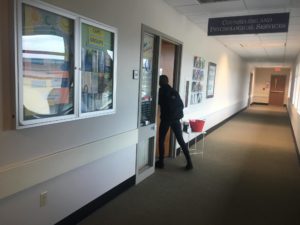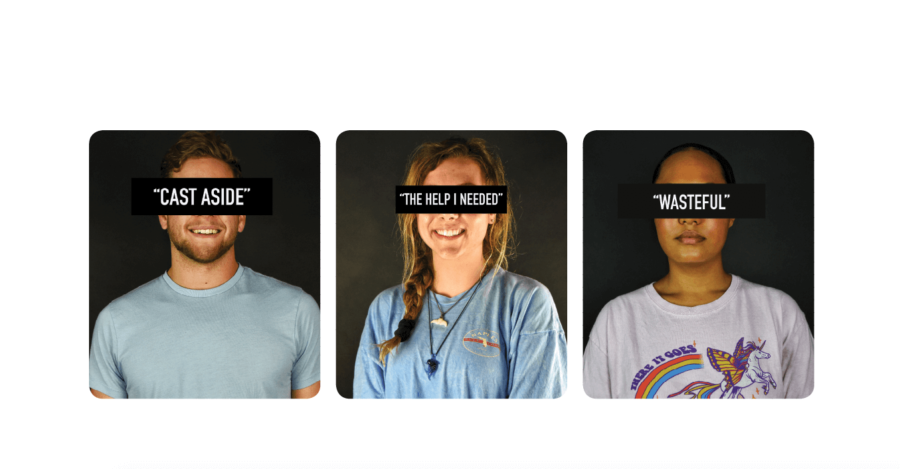How a school’s decisions can help or harm its struggling students
By Jordyn Matez and Sean C. Porter
In the spring of 2019, Florida Gulf Coast University’s Counseling and Psychological Services (CAPS) announced a new policy implementing a change in operations due to high demand by the student population for services.
In January 2019, CAPS defined the change as a “short-term therapy model,” meaning students are limited to only the amount of meetings they need in order to address their needs per semester.
According to CAPS, that number is six.
“I feel kinda cast aside,” said Forest Dennis, a sophomore at FGCU and a former CAPS patient. “It’s just kind of like, maybe my needs aren’t as important as somebody else’s — which is potentially true, but is it really theirs to decide?”

Dennis first requested services from CAPS in the beginning of the spring 2019 semester due to a flare-up in depression and anxiety. He had been to therapy for similar issues before and decided to utilize the free services provided by the university for college students in crisis.
After being assessed by CAPS, Dennis began bi-weekly therapy sessions in order to gain control of his mental health issues.
By his sixth meeting in mid-March, Dennis said he was told not to return.
“They said don’t come back,” Dennis said. “They implied that I was not as high of a risk as some other people who may need to go past six meetings.”
Dennis, who now sees an off-campus therapist, was aided by CAPS in his search for transitioning to a new therapist and reminded frequently throughout his time with CAPS of how many meetings he had left.
While he mentioned having an overall positive experience with his one-on-one therapist, Dennis remains unsatisfied with the way he was treated in the CAPS offices.
“Overall, it seems like there’s some lapses in communication between the therapists and the people at the front desk,” Dennis said. “The front desk ladies talk like they’re trying to diffuse you. Every time you talk to them it feels like they’re placating.”
In addition to Dennis’s small amount of given meetings, there were often scheduling issues that forced Dennis to go longer than expected without a session. He was referred to a different therapist than originally expected due to a scheduling mishap, then turned away at the front desk due to a miscommunication.
According to Dennis, it was implied that the miscommunication was a fault on his part.
During his time with CAPS, Dennis was also referred to the office’s psychiatrist, Dr. Joshua Hersh, to explore the possibility of receiving medication to control his mental health — a treatment option he had explicitly voiced his distaste for.
According to Dennis, he was verbally referred to an online course that may assist with his issue. Dennis also said Hersh suggested he fill Dennis a prescription of Wellbutrin to help with depression and concentration.
Wellbutrin is often used to treat depression. At the time he was offered the prescription, Dennis had not been diagnosed with any mental health disorder.
‘It was nice to have a safe place to go’
Freshman marine science student Jordan Maloney was feeling the pressures of transitioning to college early-on in her first semester at FGCU. Overwhelmed and unable to compete with the stressors in her life, Maloney found a safe haven in CAPS.
This was a nice change from her previous therapy experiences — court-mandated sessions in high school that left her resentful towards therapy in general.
Regardless of the positive experience she’s had with CAPS, Maloney has struggled with coming to terms with the fact that she won’t be able to continue seeing her therapist after her six meetings are up.
“I do definitely wish I could go more because it’s so helpful,” said Maloney. “But I do understand that it’s in high demand and other people need it more than me.”
While CAPS continues to stress that the new policy was set in place in order to control the increasing amount of students seeking services, some patients are struggling with the reality that they won’t be one of the few selected for long-term therapy.
This new policy casts a dangerous air surrounding the already-fragile stigma surrounding mental health patients. The stigma that has risen around mental health stems from both research and a heightened sense of social awareness on the subject.
According to the National Alliance on Mental Illness (NAMI), 75% of lifetime cases of mental health conditions begin by age 24. Because most students at FGCU are under this age threshold, this statistic is relevant.
The majority of people, especially students, are becoming increasingly upfront about their mental health, and awareness has become a prominent part of workplaces, as well as schools.
Additionally, according to NAMI, one in four young adults between the ages of 18 and 24 have a diagnosable mental illness and more than 25% of college students have been diagnosed or treated by a professional for a mental health condition within the past year.
‘To only go and talk for one hour at a time every three weeks isn’t enough’
Sophomore Grace Lane had never been to licensed therapy before her initial CAPS appointment. She was urged to try therapy by friends due to recurring panic attacks that had arisen in the fall 2018 semester. Having only one meeting left to try and solve all of her mental health problems, however, Lane is struggling to come to terms about losing her support system.
“I still can’t really wrap my head around the fact that they’re going to be kicking me out in a couple weeks,” said Lane. “It almost feels like all these sessions are going to waste.”
Lane has had an incredibly positive experience with CAPS thus far, having finally found someone outside of her inner circle to confide in. She trusts her therapist wholeheartedly with information she never thought she would be able to speak about.
Lane saw her therapist for the fifth time earlier in the week, where they discussed options for where to go once she had used her final meeting. Finding an off-campus therapist, while financially feasible, puts Lane in a potentially comprimising situation, because her parents are still unaware that their daughter sees a therapist.
Group programs through CAPS were also discussed as an alternative form of therapy, but Lane voiced her discomfort about sharing intimate details of her life with strangers.
Currently, Lane plans to spend the summer without seeing a licensed therapist.
“I spent all this time working with (my therapist) and she really helped me in so many ways,” Lane said. “Come summer, I’m not even going to be here so I’m not going to have anyone. Even if I do come back for fall semester, just six sessions isn’t going to be enough.”
‘We had to try something new’
While an initial view of the policy looks like a restriction on mental care, Dr. Michael Ghali, the clinical director at CAPS, assures students that this is a change that needed to happen.
The change needed to happen because the wait lists for CAPS were expanding while CAPS itself wasn’t. Although clinicians are paid for by the students through tuition, Ghali said money and space are still an issue.
“We get a lot of support from administration in terms of trying to help us expand. Obviously we don’t have unlimited funds at the university,” Ghali said. “If we have a student who takes a typical 15 credit hours a semester, a student would end up paying about $49 to CAPS. So, if we were to compare that to what a psychologist costs in the community, it’s about $175 for a one-hour session. How are we going to generate more money to pay for counselors so that we can survive?”
While this is true, not everybody at CAPS is a licensed psychologist. According to its website, CAPS’ employees consist of therapists, counselors, psychologists, psychiatrists and more, all of which have varied rates. Out of the 29 employees listed on the website that provided (not counting guest services and administrative staff), eight are licensed psychologists.
The focus of CAPS is to serve as many students as they can, which is limited by the physical space available for use. In its current location, CAPS operates in the second floor of Howard Hall.
Because of the lack of physical space, hiring people for a position they can’t physically be in is unrealistic.
“When we have 50-plus people waiting for an appointment and waiting to get started in therapy, it just got to the point where we said, ‘we have to try something new,’” Ghali said. “I ran a lot of numbers in terms of, how many clinicians do we have and how can we give people as much as we can, but be able to offer as much as we can to all of the students that are requesting it? So that’s how we arrived at six per semester, and that started this semester.”
Ghali has said that the implementation of the six meetings wasn’t the first option for CAPS, and instead options like group sessions and online resources could be the key for treatment in the meantime.
One of the reasons Ghali believes that stress and anxiety are so prevalent with today’s students is the amount they are putting in outside of the classroom.
“One of the things we know is that we have a higher percentage of students who work part or full time at FGCU than — I believe — anywhere else in the Florida State University system,” Ghali said. “So the stress that comes with trying to be a full-time student trying to work full or part time, a lot of times students are passing some or all of that money along to families, so there’s stress that goes along with that.”
While working can provide its own form of stress, FGCU President Mike Martin believes that one of the key factors to tackling stress is adding on-campus jobs.
“One of the things we’re trying to do now is create more jobs on campus because there’s good data to show that the best form of financial aid isn’t a scholarship,” Martin said. “It’s a job on campus. That’s a stress reliever in lots of ways because you can build your schedule academically around the work you can do on a part time basis, you feel as though there’s more you can do in the university in ways you don’t otherwise feel, and you have some ownership in your own degree.”
Martin also feels that students should be weaning themselves away from CAPS.
“I think CAPS can help, but I’m also a believer that, at one point, you’ve got to be introspective and self-analyzing enough that you can find the things that give you relief beyond all the other tensions in your lives,” Martin said. “When you can find those things, then you can manage it better and when you need formal assistance it can be there. But in many cases it’s a matter of knowing what your stress reliever is.”
The opening of the new building for CAPS seems to be the light at the end of the tunnel for both Ghali and Martin. Now, in their efforts to expand, they both say their hands are tied due to space.

Currently, FGCU intends to continue the production of the building that will house the new CAPS offices. The building, which Martin referred to as “Campus and Community Counseling,” will include CAPS, adaptive services and the school’s mental health counseling training program over three stories and 27,000 square feet.
Families around Lee County will be able to receive family counseling on campus at a low cost through the new program, while FGCU students will receive opportunities for internships and on-site job experience.
Though Ghali said that he hopes the new building will provide enough space to budget in a couple additional counselors, CAPS will not expand along with its new home.
As for the policy, Ghali remains hopeful that CAPS will eventually gain enough resources to redact the rule. Initial indications have shown that the new policy, while helping CAPS manage the demand for service, have not had any significant impact in client satisfaction aside from the typical factors.
“(Therapists) go into this profession because we really want to help people,” Ghali said. “That’s where our hearts and minds are every time we come into work, and to tell people they might have to wait is a terribly painful process to go through. That’s why we’re thinking of all these different options to try and best meet the needs of our students at FGCU — because we care about them.”


































